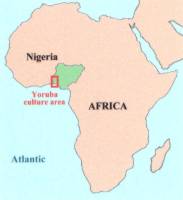Our Mission Station In Abbeokuta (Map - Abeokuta)
There was a similar station but much less developed in Abbeokuta, 100
miles interior, of, which we were to take charge later, and a third, about
the same at Ogbomoso, 200 miles interior, from which we were entirely
cut off by tribal wars. These stations were in charge of native teachers
whom Brother David had developed from the converts of the old missionaries.
The leading man among these native teachers and preachers, was Moses Stone,
then in charge of the station at Ogbomoso. He was a man or real native
ability and eloquence and much looked up to by the (Page 10) natives but
had little educational advantage. Another, the teacher at Lagos was Louis
Murray, a faithful assistant. He is still living I think. I recently had
a letter from his son in London who was there pursuing his higher education.

It is of prime importance for the new missionary to learn the language. The Yoruba language is very difficult in itself. Add to this the lack of literature and of efficient teachers, naturally it become more difficult. Add to this again the fact that "the laborers are few" - so few in fact that the new man is immediately put to work doing the best he can, preaching, teaching and what not, by means of native interpreters. So naturally, learning the language is compelled to because of secondary importance.. So that while most of them learn to speak it in a way, sufficient for conversation, some never even try to preach in it alone, but always through an interpreter.
I have said that we were to be located at Abbeokuta, a city said to have 200,000 inhabitants, 100 miles up the Agun River from Lagos. The size can be only an estimate, for I am sure no census was ever taken. It was some months later, - perhaps in October or November, before we went, It was a journey, of several days made in a large canoe, propelled by two men - one at each end with a pole in hand which was placed on the stream bed, and the boat pushed along. Our goods were placed in each end of the boat and our living quarters were in the center of the boat covered with native mats somewhat after the mariner of the old covered wagon.
Under this was placed our bed, our food, and clothes and whatever was necessary for our journey.
(Page 11)
The length of time required for the journey was somewhat according to the state of the river, perhaps four or five days. If the river was low, the boat men would often have to get out and pull the boat off of the sandbar. If high, we made better progress. The men were always cheerful and good natured - never seemed to get tired and spent much of their time laughing and talking with each other or with the white man. We ate our meals from our lunch box, sometimes buying food from the native markets. At night we stopped at a little village, tied our boat to the bank, and slept in our boat. We were never molested except by mosquitos which were ever present.
The natives were always friendly and good-natured. Their main interest was just a natural curiosity to see these strange people with their curious manners, eating with knives and forks, etc. They were true to the saying that "fingers were made before forks. I remember the first night of this first journey we drew up near dark at a small village, and the people, all excitement, began to run over our boats, chattering like monkeys. Since we did not know a word they were saying, we were rather disturbed as to the meaning of it all, but later, when we came to know them better, we knew it was nothing but a friendly interest and never feared them. And, of course, they with their customs were just as strange to us as we were to them. I remember one morning, when the river was high, we saw a strange object floating on the water a small calabash or gourd. We asked the boatman to bring it for us to see. He hesitated, but went and got it, and we found in it a young pigeon. Asked for the explanation, they said it was an offering to the god of the river. We took it home, named it "Moses" - taken from the river, and kept it a long, time for a pet. We often made these trips, usually by water, though there was a land route possible at certain tines.